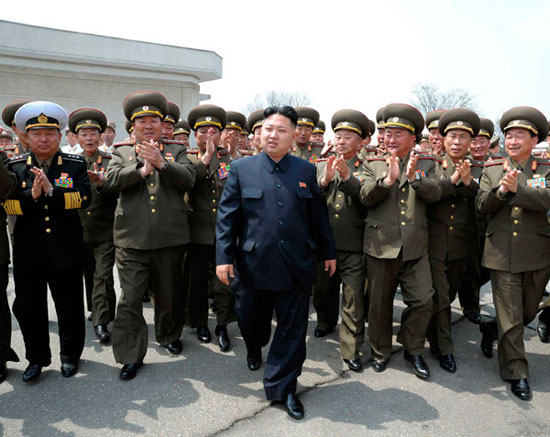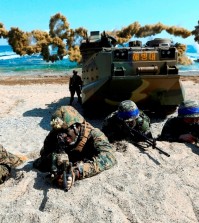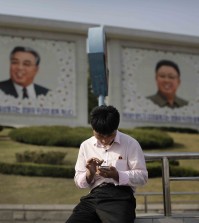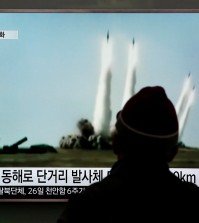- California Assembly OKs highest minimum wage in nation
- S. Korea unveils first graphic cigarette warnings
- US joins with South Korea, Japan in bid to deter North Korea
- LPGA golfer Chun In-gee finally back in action
- S. Korea won’t be top seed in final World Cup qualification round
- US men’s soccer misses 2nd straight Olympics
- US back on track in qualifying with 4-0 win over Guatemala
- High-intensity workout injuries spawn cottage industry
- CDC expands range of Zika mosquitoes into parts of Northeast
- Who knew? ‘The Walking Dead’ is helping families connect
North Korea’s trade volume posts record high

North Korea saw its trade volume reach a record high last year despite tough international sanctions, according to the state-run Korea Trade Investment Promotion Agency (KOTRA).
By Chung Min-uck
North Korea saw its trade volume reach a record high last year despite tough international sanctions, according to figures from the state-run Korea Trade Investment Promotion Agency (KOTRA), Thursday, mainly due to robust trade relations with China, its main ally.
The KOTRA data showed Pyongyang’s total trade volume jumped to $7.3 billion last year, up 7.8 percent compared to the previous year, with both exports and imports growing by 11.7 and 5 percents, respectively.
Consequently, the trade deficit for the country was also reduced to $980 million from about $1 billion a year earlier, according to the trade agency.
The total trade volume marked a record high since the trade agency began compiling the data of North Korea’s state of trading in 1990, said KOTRA.
But the data showed that the reclusive nation’s reliance on China still remained high, accounting for almost 90 percent of all trading.
The North’s export items are largely natural resources including bituminous coal, iron ore and mineral ore, whereas, its major import items from China are electricity, grain and transportation devices.
Experts say the numbers show Beijing’s earlier call for strengthened economic sanctions to be imposed on its communist ally did not have any significant impact, and that the world’s No. 2 economy appears to be taking a different path, vis-à-vis other countries, when dealing with the provocative nation.
Led by the United States, its allies including Seoul and Tokyo and the United Nations Security Council (UNSC) have agreed to strengthen economic sanctions on the North in early 2013 following the North’s missile launches and a nuclear test.
Beijing, a veto-wielding permanent member of the powerful UNSC, voted for the move and also on numerous occasions urged its neighboring country to abandon nuclear weapons and missile programs.
“For China, the strategic value of North Korea grows more and more in proportion to its rivalry with the U.S. and Japan,” said Yoon Dae-kyu, director of Institute for Far Eastern Studies at Kyungnam University. “North Korea borders China’s territory and the stability in North Korea is the most important thing for China.”
“China will surely participate in the international move of implementing sanctions on the North but only to a point where the sanctions don’t hurt North Korea’s stability,” the director added.
Meanwhile, given the heavy reliance on China, some experts say the North will turn to Russia, its second largest trading partner, or South Korea to diversify its markets.
Dubbed the May 24 measures, almost all trade exchanges with the North, except for the inter-Korean factory park in the North’s border city of Gaeseong, were severed on May 24, 2010, following the North’s torpedoing of the South Korean corvette Cheonan in the West Sea in March that year.
The bilateral sanctions rapidly decreased the volume of cross-border trading which allegedly led to Pyongyang’s high level of trade dependence on China.
















